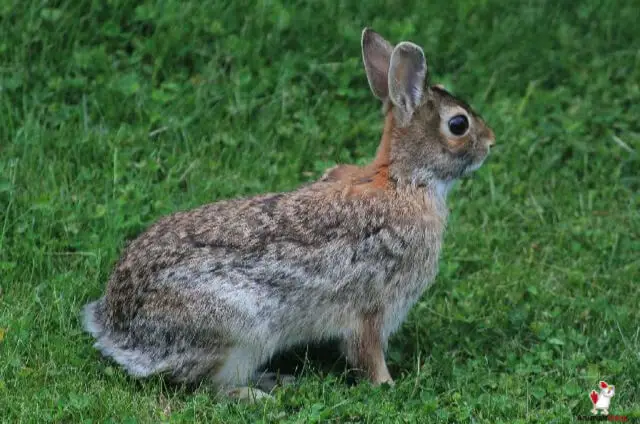The best answer is in the middle – yes and no. In the many available lists of rabbit foods, bread is neither a toxic food item nor is it part of a bunny’s natural diet.
It is important to note that many experts answer NO to the question of focus. What you should mainly remember is that the digestive systems of rabbits are very different from ours. Our guts are made and meant to process most things. On the other hand, rabbits can only process glucose, meaning that they only need certain fruits and leafy greens.
Bread is loaded with complex carbohydrates and a lot of starch. So, if you feed your rabbit starch without limits, it is likely to have these problems:
1. Possible diarrhea
2. Runny stools
3. A difficult time breaking down the bread
Apart from the problems mentioned above, the rabbit can become inactive and thus overweight. As you may already know, a rabbit with a lot of weight is susceptible to other health problems.
Rabbits, Eating, And Bread
Among the many food items, there are not many that are as versatile as bread. Bread is enjoyable and comforting. Many people like having bread for breakfast and brunch. If you’re a bread lover and a rabbit owner at the same time, chances are that you’ve asked yourself the question that is central to this article – is it OK if I shared my bread with my Mr. or Mrs. Bun Bunny?
If you’re not staying around and are in a hurry, here’s what you can take home – yes, rabbits can munch and nibble on slices of bread. However, they really should not be eating it.
But you’re in luck as there are many treats that are wholesome and that your bunny will surely enjoy. If you stick around till the end, you will get an insight into the nutritional specifics of bread. Also, you will get to know the three top human foods that are OK for rabbits to partake in.
Stats: Bread Nutrition
As mentioned, bread is not too good for your rabbit. But, it is perfectly healthy for your gut. Once you pick a packet of bread, it is essential to check the label with the nutritional facts. Depending on the brand of choice, the details will vary. Check the following table for some generalized information:
| Average Contents Of A Whole Wheat Bread Slice | |
| Calories | 128 |
| Carbohydrates | 6g |
| Fiber | 8g |
| Protein | 8g |
| Fat | 5g |
You will want to take a look at the label of the bread. This will help you to know the nutrients that the bread will provide.
| Average Nutrient Details In A Whole Wheat Bread Slice | |
| Manganese | .3mg |
| Iron | .8mg |
| Selenium | 6mcg |
| Folate | 22mcg |
| Riboflavin | .1mg |
| Niacin | .8mg |
| Thiamine | .1mg |
| Copper | .1mg |
| Phosphorus | 2mg |
This is it – bread indeed contains some essential and wholesome items. But, your rabbit can get the same nutrients from other healthier sources that are friendly to their gut.
Let’s move a little forward by taking a step further. While bread may not bear any toxins, the main reason why rabbits shouldn’t eat it is its carbohydrate detail. The starches are likely to make the rabbit very sick.
Do Rabbits Even Like Bread?
Well – yes, yes, they do. We can safely say that rabbits can’t look away when you stick out a slice of bread near their mouth. But remember, we believe that rabbits and bread should not be mentioned together. But if you plan to go through with this very starchy plan, here’s a guideline that you can use. It tells you the amount of bread you should feed your rabbit depending on their age.
| Age – Amount Of Bread Match For Rabbits | |
| Age | Amount |
| Baby Rabbits | No bread at all |
| Juvenile Rabbits | No bread at all |
| Adult Rabbits | ½ inch cube of bread |
If you feel like you want to do it so much, we recommend that it only remains a tiny nibble – just that. The majority of the rabbit’s diet should be of fiber-rich rabbit food such as hay. Also, you can include a few natural treats.
The Correct Diet For A Rabbit
Our opinion still stands – it is better to opt-out of bread slices and give your rabbit food that will benefit their health. As suggested in previous lines on this article, bread slices should be reduced into a rare treat given once a month. Now that bread slices are off the menu, what exactly do rabbits eat?
What Rabbits Eat
Wild rabbits eat a wide variety of leafy plants and long-stemmed grasses. You will find bunnies spending a lot of their time nibbling on any fibrous plant they find. Factually speaking, these kinds of leafy greens help their guy to keep moving.
If your rabbit wouldn’t be nibbling as adorably as they do, they could develop a condition known as GI stasis. This is a dangerous and unwanted situation that could lead to a serious illness or even a fatality.
Also, nibbling helps the rabbit to improve dental health and keep its teeth just at the right length. You should know this – the teeth of a rabbit grow all the time and need to be shredded. If you can get any long-stemmed grasses all the time, always keep chewable toys near the rabbit.
Here are some food options you should consider when choosing the main portion of your rabbit’s diet. All the options are of fibrous plants which will maintain and improve the health of your bunny:
1. Fresh Hay. For a long time, this option has been taken to be the cornerstone of any rabbit’s diet. Varieties like orchards, Timothy, and oats are ideal, and you ought to supply your bunny with the said foods unlimitedly. Overeating bread could make your bunny sick, but not if it is nibbling hay. The latter is a healthier habit.
2. High-Quality Rabbit Food. These commercial food products are essential. The good thing is that they come in good packaging with details on the nutritional value. You will also know the right amount of feed to give to the bunny, depending on its age and weight.
3. Fresh Foods. While these may not be necessary, it would be nice for your rabbit to have them. So, you can give your bunny about a cup of leafy greens. You can top that offering off with a crunchy veggies tablespoon – one tablespoon for two pounds of the rabbit’s body weight.
4. Tiny Amounts Of Fruits. Your rabbit will be delighted if you offer them fruit as a special, occasional treat. It would help if you gave the rabbit one teaspoon of the fruit for every 2 pounds of its body weight.
Apart from the food, remember always to keep your rabbit’s water bottle full every day. Also, a day shouldn’t pass without your rinsing and cleaning it. As mentioned elsewhere, keep your rabbit and let them chew on their toy or blades of hay. Remember that this keeps the animal’s teeth in check in terms of controlling their length.
The Human Foods That Rabbits Can Eat
As implied between some of the lines already read, most of your rabbit’s diet should consist of leafy greens. The other part should be reserved for any treat (apples, berries, et cetera).
As you continue to take down section after section of this article, have it in mind that rabbits have delicate stomachs, unlike humans. While some foods may be harmless to you, they could get your rabbit intoxicated. If you are in doubt, ensure that the food of interest does not come near to the rabbit’s mouth.
But rabbits, well, are just that – rabbits. They have a great love for eating and powerful taste buds. So, they will eat anything and everything that comes their way. As it is your sole responsibility to handle the eating aspect, here are some three of the human foods that rabbits will enjoy.
1. Carrots
Rabbits are depicted in cartoons as lovers of carrots. But, carrots are not recommended by experts since they have high sugar content. The problem is that rabbits will gravitate towards the sweetness of things. So, ensure that you give the carrots but in moderation.
And, what is the effect of overfeeding rabbits with carrots? Your rabbit can become obese and develop and an array of digestive issues. As an occasional treat, carrots will give the rabbit a healthy vitamin A dose. You may already know that vitamin A offers eyesight improvement not only for rabbits but also for humans.
Instead of the carrot roots, you can offer carrot tops and leaves more freely. The tops have vitamins A, B6, C, and K, thiamine, folate, potassium, manganese, and niacin.
2. Lettuce
When it comes to lettuce, the options you should take are the more fibrous varieties, such as romaine lettuce. This type of lettuce will offer the following to your rabbit – fiber, magnesium, calcium, vitamins K and C, potassium, and folate. The one good thing about lettuce is that it has low calories. So, it is unlikely to make your rabbit obese. Also, they will offer your rabbit a decent hydration amount.
3. Celery
If you want your rabbit to get folic acid healthily, choose celery stalks. This food will also give the rabbit calcium, potassium, and vitamins B6, B2, and B1. There are no risks taken in offering celery stalks to the rabbit. So, you can offer them as part of your rabbit’s daily fresh-food intake.
Apart from the vitamins, celery contains particular compounds known as phytochemicals. These help to fight inflammation, prevent cancer, and lower blood pressure. Also, celery, like lettuce, is an excellent water source for bunnies.
Apart from the stalks, it is safe for bunnies to eat celery leaves without developing any complications. A friendly reminder is that, like any other vegetables, do not feed the rabbit too much celery.

I’m Christopher Benjamin, a dedicated Animal Nutritionist at Ethos Veterinary Health with a Bachelor of Science in Animal Science from Michigan State University. My lifelong passion for animals led me to establish AnimalsData.Com. Here, I share expert advice, educational resources, and inspiring stories to empower fellow pet lovers worldwide. Join our community as we celebrate the beauty and diversity of our beloved animal companions!

